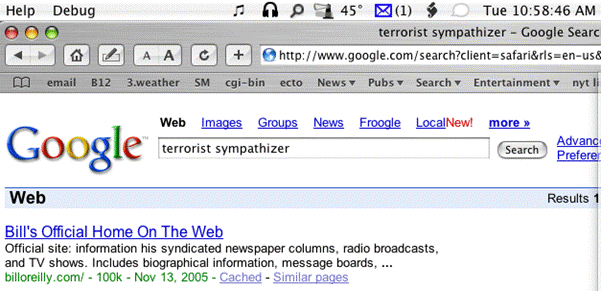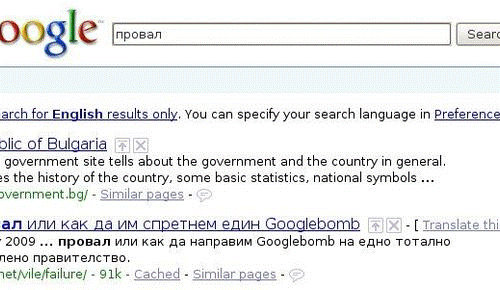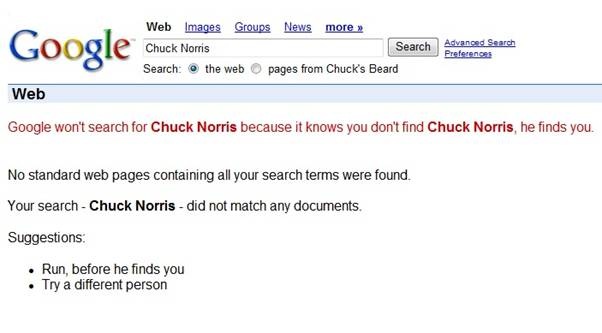Chances are that even if you’re unfamiliar with the term, you’ve experienced a Google bomb in action somewhere on the internet. Once, they were a rarity, a novelty even, but now there are hundreds of them out there on the web. Many are politically motivated and most include some kind of derogatory reference.
An explanation for those to whom this is alien: a Google bomb is a cooperative endeavour undertaken to manipulate the Google search engine into returning a particular web site as the first result when a specific word or phrase is searched for.
Because Google generally ranks web sites by the number of other pages that link to them with the same anchor text, the results of a search can be influenced by having even only a few sites link to the target page – although obviously the more the better.
The anchor text that fuels the bomb can be left in many places around the web: message boards and article or blog comments all add to a link’s popularity. Recent changes to the way Google works have made it more compliant with sites like Digg, Wikipedia and YouTube, which can be used to create a ‘buzz’. Even the simple volume of searches for a specific term can affect a bomb’s success or failure.
10. Nicolas Sarkozy: Trou du Cul du Web?
In September 2010 a large group of disgruntled bloggers linked a crude French phrase (“trou du cul du web” or “The Asshole of the Internet”) to Nicolas Sarkozy’s Facebook profile. The campaign was successful and the French President’s page on the popular social networking site became the first result returned by Google’s search engine.
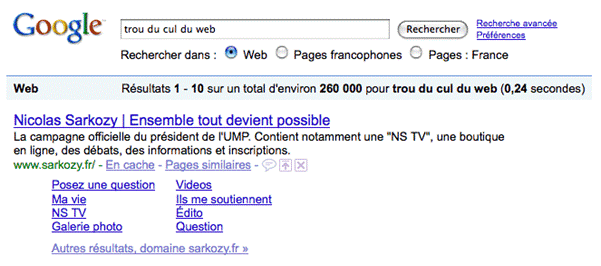
The bomb was short-lived, however, because the Facebook profile was taken down almost immediately after being noticed. According to a source within Google, the bomb was ‘defused’ by an algorithm intended for just that purpose.
This wasn’t Sarkozy’s first brush with Google bombing. In June 2009, he was targeted in an almost identical manner in retaliation for his hard-hitting approach to illegal filesharing.
9) Bill O’Reilly: Terrorist Sympathizer?
Outspoken political commentator Bill O’Reilly is a man used to controversy and disagreement. He is well-known for his hard-line political and social views, so it comes as no surprise that a Google bomb was attempted against his personal web site back in November 2005.
Web site dailykos.com called for bloggers to post links to O’Reilly using the phrase “terrorist sympathizer” in the anchor text, after he described his dislike for US city San Francisco, saying that: “Every other place in America is off limits to you [Al Qaeda], except San Francisco: you want to blow up the Coit Tower? Go ahead.”
8) Andy Pressman: Talentless Hack
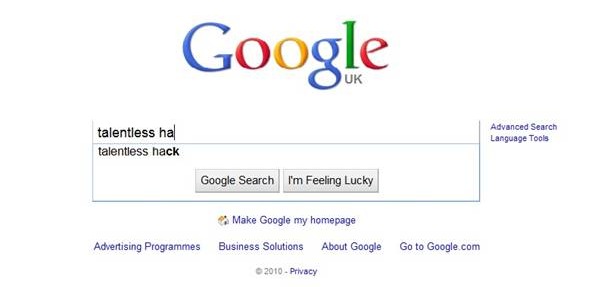
While the expressions “search engine bombing” and “results hijacking” had been used in the late 1990s, the internet’s first practical joke to be given the name “Google bomb” came about thanks to Adam Mathes. He discovered that Google used links to determine page rankings while perusing ‘internet rock star’ Ben Brown’s website.
Mathes used the technique (with help from fellow bloggers) to get his friend Andy Pressman’s web site to the number one result returned by Google for the term “talentless hack”. Mathes is widely credited with creating the “Google bombing” expression when he used it in an article for the online magazine uber.nu in April 2001.
7) Scientology: Dangerous Cult?
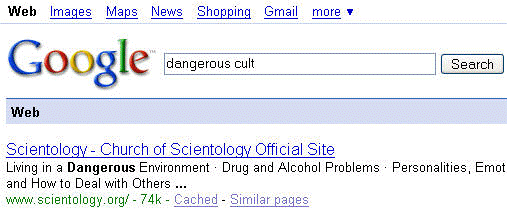
The controversial Church of Scientology came under fire in 2008 from an enigmatic group calling themselves Anonymous. In what has been described as “a highly organized and carefully orchestrated Internet campaign,” Anonymous managed to get the phrase “dangerous cult” to return the Church of Scientology’s homepage as the top result in early 2008.
6) Tony Blair: Liar?

The year 2005 saw the word "liar" used against Tony Blair in a Google bombing campaign, focused on Google.co.uk. The bomb linked to an official biography of the then UK Prime Minister and was a commentary upon Blair’s military involvement in Iraq and the search for weapons of mass destruction. Tony Blair was also the target of another Google bomb which tried to connect him with the word “poodle” – a reference to the idea of him being American President George W. Bush’s lapdog.
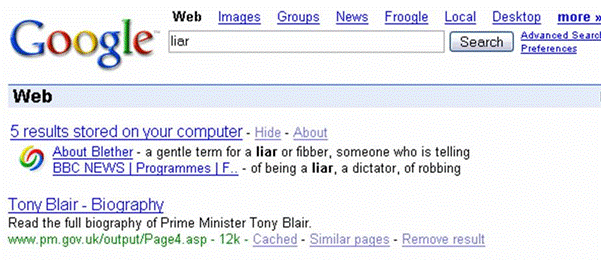
5) French Military Victories...?

In 2003, the then 22-year-old Toronto student Steve Lerner created what has become a famous (or perhaps if you’re French, infamous) Google bomb</a>. Entering the search phrase “French military victories” and hitting the I’m Feeling Lucky button takes the searcher to a mocked-up page of Google that says, “Your search – French military victories – did not match any documents. Did you mean: French military defeats?”
However, this is more of a clever SEO technique rather than a true bomb, as the end page gets an uptick in traffic. Indeed, Lerner said he received 50,000 hits in 18 hours. He described his reason for creating the page as: “A humorous way of showing political opposition against France's weaseling.”
4) George W. Bush: Miserable Failure?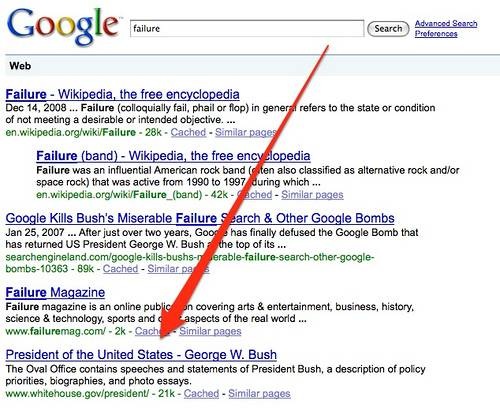
Like Sarkozy and Blair, George W. Bush has been on the receiving end of multiple Google bombs. Satirical magazine HugeDisk created the first one back in September 2000, by linking an expletive with a site that sold Bush-themed products. This particular bomb was put to an end by the site’s lawyers and a cease-and-desist letter.
The former president of the United States was then targeted several years later in what could be the most famous Google Bomb of all time. As he ran for a second term in office as president, a Google search for the phrase “miserable failure” would take the user to Bush’s biography on the official White House web site. Despite this, Bush was re-elected. The Bomb was eventually doused in 2007, when Google altered its indexing structure.
3) The “Collapse” of the Bulgarian Government
The 2007 change in Google’s indexing structure resolved most existing Google Bombs – but it didn’t make them impossible. In January 2009, a group of bloggers and forum users discovered that the Bulgarian government’s website’s robot.txt file prevented Google from properly indexing it. Using this, the group managed to push the government’s website to the top ranking spot for the expression “провал” – meaning “ruin”, “failure” or “collapse” – in every language.
2) Microsoft: More Evil than Satan Himself?
What is broadly acknowledged as the first ever Google bomb came about back in 1999 when many people were still on dial-up connections and sites like Facebook and Twitter were a mere twinkle in cyberspace’s future. It was Microsoft’s homepage that provided the target for virtual bombers, becoming the number one result when a search for “More evil than Satan himself” was entered. The phrase is a reference to the riddle: “What is more powerful than God himself, more evil than Satan? The rich want it, the poor have it and if you eat it, you'll die.”
(That answer, of course, is nothing.)
1) Chuck Norris Finds You
As one of the most popular internet phenomena, Chuck Norris’s name is now synonymous with memes. Adding to this trend, Arran Schlosberg created a site called NoChuckNorris which, like French Military Victories above, is intended to fool the visitor into thinking it is a real Google results page.
The page echoes the widespread viral ‘Chuck Norris Facts’, and upon searching for “Chuck Norris” and hitting I’m Feeling Lucky informs the visitor that “Google won't search for Chuck Norris because it knows you don't find Chuck Norris, he finds you.”
In 2008 NoChuckNorris received over 4,800,000 unique visitors.
Bonus: Justin Bieber

While often used for political or subversive motives, there are also bombs that are purely around in the name of mischief. The notorious picture board 4Chan targeted tweenie-pop star Justin Bieber with a Google bomb in June 2010:
“Go to Google and search ‘Justin Bieber Syphilis’. Let’s get this to be No. 1 searched phrase on Google Trends. Use an autoclicker or macro if possible and get others involved. Unlike a death rumor, this will be hard for him to disprove.”
Users of the site bombarded Google with thousands of searches for the phrase: “Justin Bieber Syphilis”. By midnight it was at the top of Google's U.S. Hot Searches. While this isn’t a traditional Google Bomb (as it doesn’t attempt to manipulate search results) it certainly is an attempt to artificially shift traffic patterns!
Later the same year 4chan users tried to get Bieber sent to North Korea by voting for the destination in a poll for which country he should perform in.




